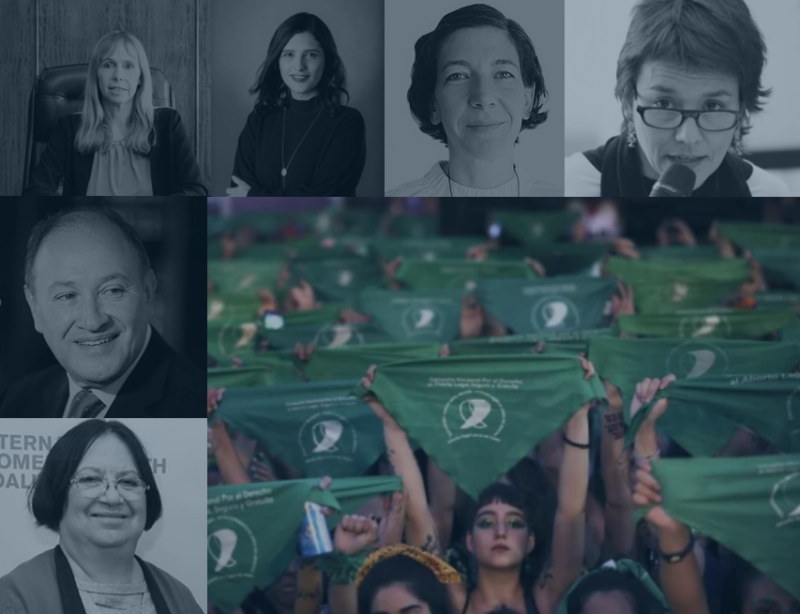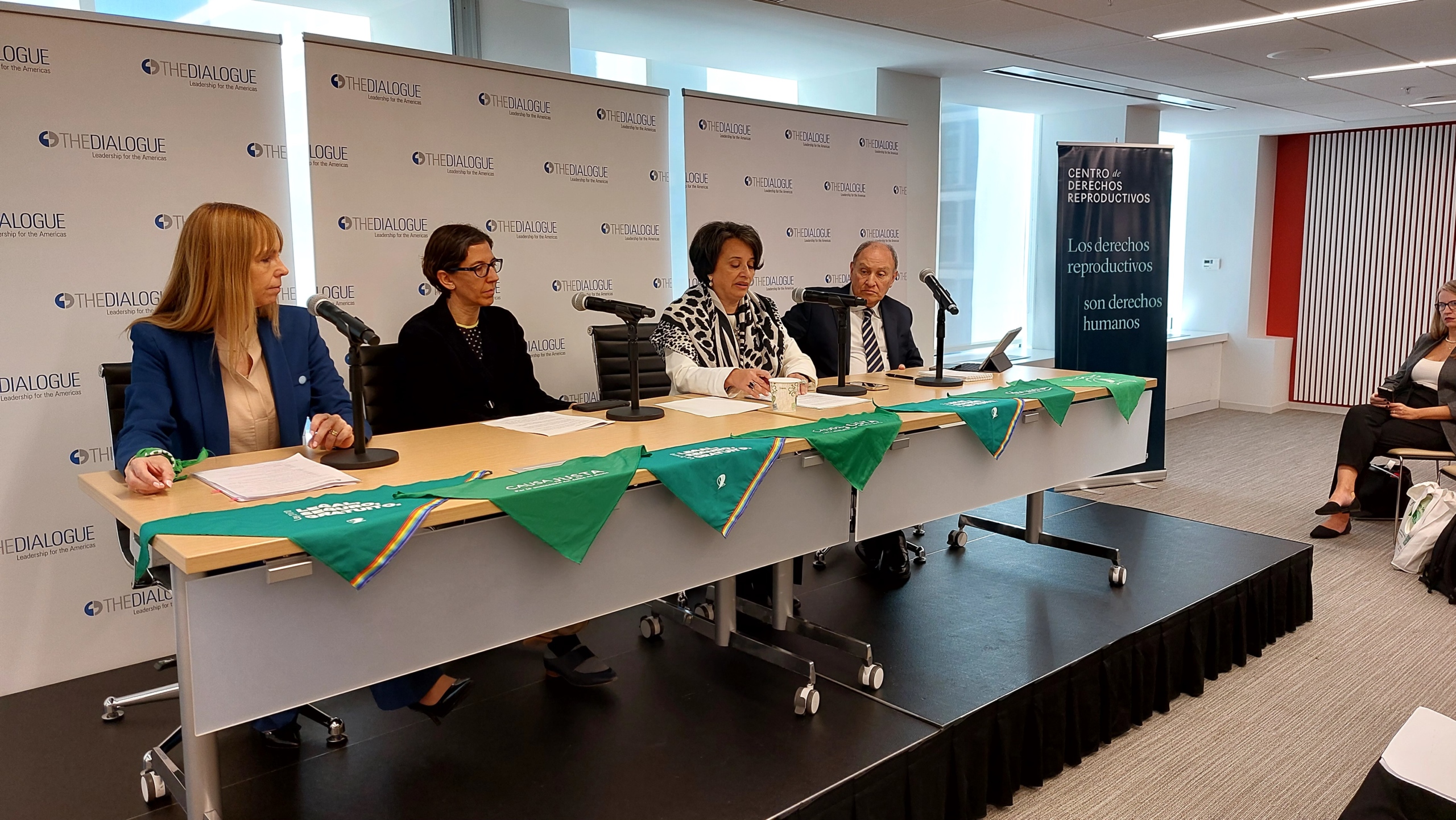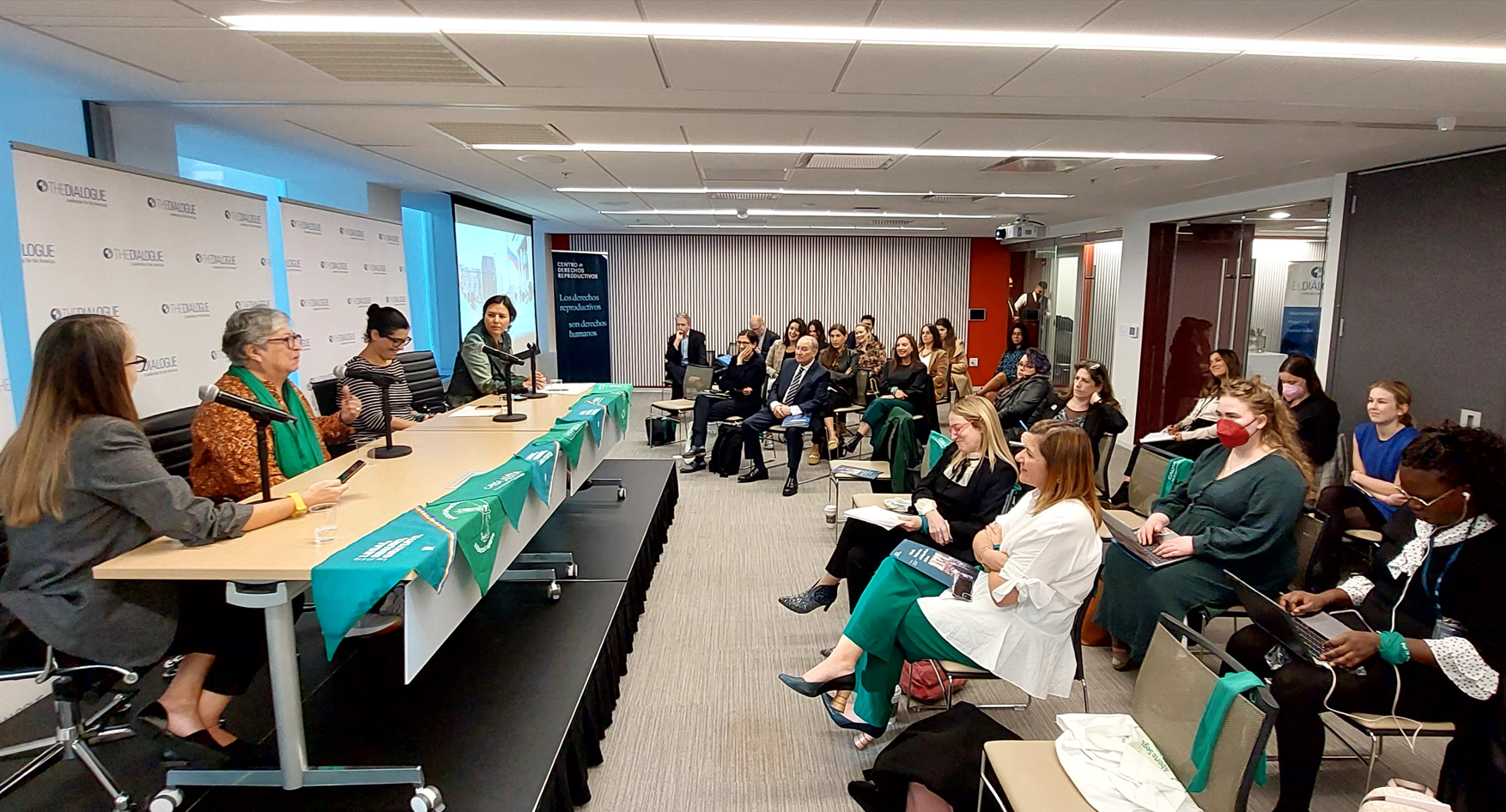Faces of the Latin American Green Wave: From Argentina to Mexico, Leaders Share Their Experiences
 © 2020 Natacha Pisarenko/AP Photo | Accessed through Human Rights Watch
© 2020 Natacha Pisarenko/AP Photo | Accessed through Human Rights Watch
Amidst stark regression of reproductive rights in the Global North, the Inter-American Dialogue, in partnership with the Center for Reproductive Rights, Fòs Feminista, and the Embassy of Argentina in the United States, hosted a symposium titled “Faces of the Latin American Green Wave: From Argentina to Mexico, Leaders Share Their Experiences” on October 27, 2022. This event provided two unique avenues to explore Latin American advances in reproductive rights, analyzing the perspectives of legal and legislative decision-makers along with those of activists and civil society leaders. The panels were followed by the release of a fact sheet by Center for Reproductive Rights titled, “Colombia: Historic Advancement in the Decriminalization of Abortion with Regional Perspectives.”
Elizabeth Belair, chief of staff at the Inter-American Dialogue, opened the event detailing the setbacks in reproductive freedom in the Global North and highlighting the Inter-American Dialogue’s distinguished work on gender and social inclusion. Following Belair, Ambassador of Argentina to the United States Jorge Arguello accentuated Argentina’s commitment to the advancement of reproductive rights and commended the noble work of feminist activists across the world. Catalina Martinez Coral, regional director of the Center for Reproductive Rights, commented on the growing strength of the feminist movement in LAC, the importance of allies for the movement across all levels, and the critical role that constitutionalizing reproductive rights can play in ensuring the longevity of the movement’s successes. Luisa Kislinger, who serves as senior advocacy officer at Fòs Feminista, echoed the sentiments of admiration for the strength and successes of the green wave.
"As the future of reproductive justice in the United States remains extremely uncertain, we look to our neighbors in Latin America and the Caribbean to learn from their progress. What lessons can be taken from the green wave as we consider the future of reproductive rights across our hemisphere?"
- Elizabeth Belair, Chief of Staff, Inter-American Dialogue
PANEL 1: PERSPECTIVES FROM DECISION MAKERS ON REPRODUCTIVE AUTONOMY
[caption id="attachment_126701" align="alignleft" width="370"] Panel 1: Perspectives from Decision Makers on Reproductive Autonomy[/caption]
Panel 1: Perspectives from Decision Makers on Reproductive Autonomy[/caption]
Maria Claudia Pulido, adjunct executive secretary for the Inter-American Commission on Human Rights moderated the event, first paying homage to the memory of recently deceased leaders in the green wave movement. Pulido remarked on the successes of the green wave in Latin America and the hard work and bravery of thousands of women across the region required to achieve them.
Vice Minister of Health for Argentina Sandra Marcela Tirado provided a detailed history of landmarks in the Argentine reproductive freedom movement, widely recognized as kickstarting the green wave across Latin America. She credited Argentina’s success to allied work between members of all three branches of power in conjunction with civil society and feminist groups.
Alberto Rojas, former magistrate of the Colombian Constitutional Court, shared a similar detailed history of the struggle for women’s rights and freedom in Colombia. He highlighted Colombia’s recent partial decriminalization of abortion, stating that restricted access to abortion represents an incremental gain and the first step toward the broader goal of full decriminalization.
The general director of the National Center for Gender Equity and Reproductive Health of Mexico, Karla Berdichevsky Feldman, described the history the green wave in Mexico, spotlighting the 2021 Supreme Court decision which declared penalizing abortion to be unconstitutional.
Panelists underscored the need for countries to move away from a criminal approach to abortion restrictions, stressing that penal consequences pose a public health risk as they increase the likelihood of women turning to unsafe methods for pregnancy termination. Berdichevsky Feldman emphasized that legal restrictions on abortion do not reduce the incidence of abortion but do contribute to increased maternal morbidity. Panelists agreed that transforming the dialogue around abortion and approaching the issue from a public health perspective can aid in its acceptance. Rojas remarked that strategically reframing the language used to refer to abortion itself can reduce polarization among key actors.
Panelists went on to discuss that allyship and cohesion among the legislative, executive, and judicial branches is essential for success in the institutionalization of reproductive rights, but that tensions must be managed between these separate bodies. Tirado emphasized that a legislative or executive approach has the advantage of clearly defining parameters and requirements for access to services and can incorporate critical aspects of public policy such as insurance coverage, whereas considerations for access may be beyond the scope of a judicial body. However, other speakers noted that the judicial approach can be more resilient against revocation. Tirado advocated for taking a federal approach in lieu of leaving the issue in the jurisdiction of states or provinces, as federalization ensures legal uniformity and a guarantee of access across the country. Speakers shared the conviction that implementing safe and accessible healthcare services is the next challenge for reproductive rights advocates and policymakers after the right is institutionalized.
Pulido summarized one key area of agreement: for green wave victories to be expanded and protected, all levels and branches of government, as well as civil society, must place women’s rights at the center of policy. Panelists and moderator alike echoed that reproductive rights are closely intertwined with human rights, weaving the struggle for reproductive freedom into the fabric of the centuries-long global feminist movement.
"Todo esta implementado partiendo desde la evidencia científica, desde un marco de derechos humanos."
- Karla Berdichevsky Feldman, Director, National Centre for Gender Equity and Reproductive Health of Mexico
PANEL 2: LESSONS LEARNED FROM THE GREEN WAVE MOVEMENT IN LAC – ACTIVISTS’ PERSPECTIVE
[caption id="attachment_126701" align="alignright" width="370"] Panel 2: Lessons Learned from the Green Wave Movement in LAC: Activists' Perspectives[/caption]
Panel 2: Lessons Learned from the Green Wave Movement in LAC: Activists' Perspectives[/caption]
Senior Advocacy Officer for Fòs Feminista Luisa Kislinger moderated the panel. She introduced each speaker and commended each for their commitment and bravery.
Marta Alanis, founder of Católicas por el Derecho a Decidir Argentina, summarized her experiences as one of the most prominent pioneers of the feminist movement in Argentina, credited with being the first to use the green scarf to represent the campaign. Alanis reflected that a key tenet of the success in the revolutionary Argentine green wave was inclusivity; the movement was intergenerational, encompassed support from a wide variety of NGO’s and advocacy organizations, and targeted legislators through a “cross-sectional” approach, disregarding party affiliation.
Rebeca Ramos echoed Alanis in referring to the battle for safe and legal abortion as an intergenerational, collective struggle. Ramos focused on the litigation strategy undertaken by activist and legal groups; before Mexico decriminalized abortion, groups like Grupo de Información en Reproducción Elegida (GIRE) worked on institutionalizing partial protections for abortion. To achieve these incremental victories, GIRE strategically litigated cases for women who had been denied access to abortion after experiencing rape or suffering from severe health issues and won abortion protections for these circumstances.
Ana Christina Gonzalez cited the Colombian Supreme Court decision in 2006 which decriminalized abortion only in certain circumstances as a defining moment for transforming an initiative into a movement. This incremental victory garnered legitimacy and momentum for the green wave, harnessing the attention of many different women's, feminist, and human rights organizations to devise and carry out strategy. Key players in the Colombian movement like Causa Justa diversified their approach; academic and pedagogical work, social mobilization, and constitution-based legal dialogue were encompassed in their strategy. Colombian activists engaged audiences that were historically and ideologically opposed to abortion, expanding their network across the country, including into rural areas.
Each panelist singled out the concept of “social decriminalization” as pivotal to their successes and critical for sustaining progress. Shifting the culture, language, and commonly held views about abortion on an interpersonal level is essential for the reproductive rights movement. Gonzalez cited Colombian efforts to reframe the conversation around abortion, transcending the narrow scope of being either “for” or “against,” and centering the dialogue around health, inequality, and the counterproductivity of polarization. Alanis remarked that the Argentine movement harnessed the concept of shared experience, elevating the personal stories of regular women of all ages from diverse socioeconomic, racial, and religious backgrounds who had accessed abortion services, or who had been denied.
Panelists underscored that the fight for reproductive freedom does not end with a single court decision or policy. Ramos stressed that multiple, confluent efforts are necessary to continue to work for reproductive freedom: educating healthcare providers, providing technical assistance to the legislative branch for policy development, and defending the rights of women who have been denied access or criminalized. Similarly, Gonzalez highlighted three areas for continuing the progress made in Colombia: 1) implementation of the ruling through the removal of barriers to accessing service, as well as educating health authorities and legislative actors on how best to guarantee that access 2) the protection of the ruling itself, and 3) continued social decriminalization.
Panelists identified one key lesson learned: strategic diversification. Movements cannot solely depend on one branch of government. Instead, authorities and stakeholders from all levels, across institutions, and from all parts of society must be mobilized in order to maximize impact. Each panelist had their own story of how their country’s green wave movement arose, but a clear commonality was that a movement is not born of an intention or idea to invent one. It is born of a culmination of years of shared struggle, resilience, and courage, all centered in solidarity and commitment.
"Hubieron tensiones, pero nunca se quebró el movimiento. Para mí la clave es la capacidad política que logramos para contener un movimiento tan amplio, tan diverso, u que no se hayan generado quiebres."
- Marta Alanis, Founder, Católicas por el Derecho a Decidir Argentina
Watch the event recording here:
Downloads
- Colombia: Historic Advancement in the Decriminalization of Abortion with Regional Perspectives
- Argentina in Focus | Nov 2022 | Newsletter



















